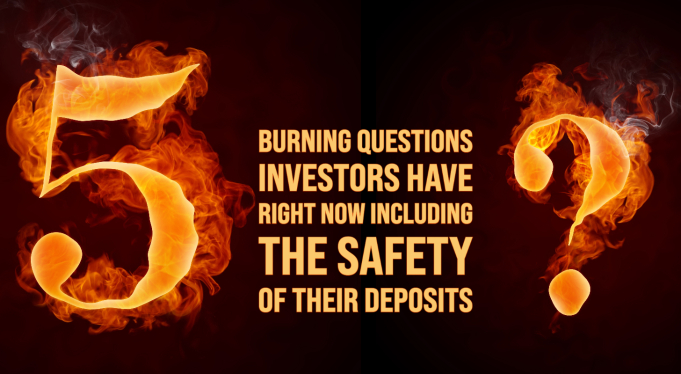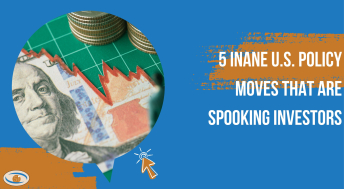Are Your Canadian Bank Deposits and Brokerage Accounts Safe?
We here at 5i Research have answered more than 155,000 questions from investors over the past decade. Once every 18 months or so, we highlight a handful of the most common and popular questions we get. Investors are wondering about many things these days with all the recent market craziness. Let’s take a look.
Are My Canadian Bank Deposits and Brokerage Accounts Safe?
This is by far the most popular question asked by investors over the past two weeks. Having multiple bank failures in the United States has certainly raised concerns with savers and depositors. The short answer is … probably.
The Canadian financial system has a different regulatory system than the U.S., and it is far less competitive, meaning banks don’t need to take as many risks. Canadian deposit insurance is $100,000, and there are discussions right now about raising this limit. Broker accounts have $1 million in insurance under the Canadian Investor Protection Fund. The Canadian record of protecting investors is solid, and our banks fared much better in the 2008 financial crisis than their U.S. counterparts.
Could a bank run happen on a Canadian bank? Sure, anything is possible, and confidence is still the key to the banking system. But as in the U.S., we would expect governments to step in and protect investors, to prevent an entire financial system collapse. Thus, we would not lose much sleep over the safety of our Canadian banks.
How Come the Market is Rallying with All the Bad News Out There?
We have high-interest rates, inflation, war, pandemics and a financial crisis, amongst other problems. So how come the markets are so resilient? Well, as they say, markets climb a wall of worry.
If you want to worry, there are plenty to choose from. But keep in mind two things. First, valuations might be lower as fearful sellers exit positions. Lower valuations can set up better investment returns for those brave enough to step in.
Second, when all the news is bad, any actual positive developments can have a larger influence. If investors are worried about eight-per-cent inflation and it comes in at six per cent, there can be some relief buying. If you expect your company to report lower earnings and it reports flat earnings, even that so-so report can spark a sudden rally since no one was expecting anything, anyway.
Will That Takeover Go Through?
Most investors are happy when one of their companies receives a takeover bid. But any bid has uncertainty. As we like to say, no deal is really done until you receive your cash. All takeover bids require shareholder approval, but many require varying levels of government, regulatory or antitrust approval as well.
Microsoft Corp. has been working on getting approval for its proposed takeover of Activision Publishing Inc. for 14 months now. Magnet Forensics Inc. shareholders are fighting its proposed privatization, as are shareholders of Canaccord Genuity Group Inc., where several directors have already resigned.
Toronto-Dominion Bank announced the acquisition of First Horizon Corp. more than a year ago, and now finds its target company caught up in the U.S. banking crisis. First Horizon shares are about US$16 today, well below TD’s bid price of US$25 in February 2022, indicating many do not expect this deal to close as is.
Should I Buy This Stock That is Down?
Some investors sense opportunity whenever the market declines. But they often need a second opinion, or maybe someone to blame if things don’t work out so well. Many questions are about whether investors should average down on losing positions. Our answer is almost always no. However, we will make exceptions when the entire market is down for some reason.
Many times, as has been the case in the past year, investors have been selling the so-called good stocks just as fast as they are selling the bad stocks. This can create opportunities. The key is to look for companies whose fundamentals are going the opposite way of their stock price (for example, earnings are accelerating, but the stock is declining). It’s not a perfect methodology, but everything gets cheaper in bear markets, and smart investors should look for opportunities amongst the carnage.
Growth Versus Value?
This is always a popular topic with investors. Should they buy ABC stock at 10x earnings with a dividend, but no growth; or should they buy XYZ stock at 25x earnings with no dividend, but high growth? We prefer growth, but don’t think any investor should pigeonhole their style in one way or another.
A boring value stock, if priced right, can still provide solid investor returns. An exciting growth stock, if priced wrong, can still blow up and cause a lot of financial pain. Both value and growth stocks can be owned, and each stock idea needs to be looked at in isolation. We think it is wrong to simply ignore an entire section of the market just because it doesn’t fit one’s investment style.
Value stocks had their day in the sun when interest rates soared, so maybe now it’s growth stocks’ turn to shine. But unless you have perfect foresight — which no one does — it might be best to own some of each style in the year ahead.
Take Care,







Comments
Login to post a comment.